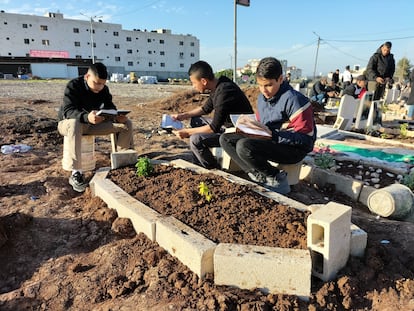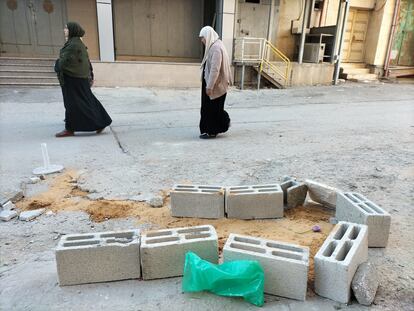Anger and grief in Jenin over deaths of two Palestinian children caught on security footage
The images have gone around the world because they show — in an unusually unequivocal way — the deaths of two unarmed Palestinian minors

Ibtisam Al Yanun parks her car in front of her house in Jenin, near the handful of bricks and sand that conceals the place where the Israeli army killed Adam Al Ghul, 8, and Basil Abu Al Wafa, 15, on Thursday. She has not repaired the holes from the bullets or cleaned up the remains of dried blood. “My husband doesn’t want to. He says the blood of a martyr is a blessing,” she says. It is the same white Hyundai into which Bahaa drags the body of his brother Adam — leaving a trail of blood — after a gunshot leaves him limp on the ground. And the one seen in the background as Basil, apparently already dead, continues to be shot. The images were captured in two videos taken by security cameras, which have gone around the world because they show — in an unusually unequivocal way — the deaths of two unarmed Palestinian minors. On Thursday, in the street where the shooting took place, friends and relatives replay the images over and over on their cell phones, as if their anger was stronger than the pain it causes them, especially in this West Bank city where the improvised expansion of the cemetery last July, following an Israeli incursion, now holds 24 more graves.
The security camera footage shows the shots, but not who fired them. Bahaa and his cousin Ashraf, both 13, were there. They live on the same street and recount how they had gone up to the intersection with Haifa Street to watch Israeli troops withdraw from their 16-hour raid on the city’s refugee camp, in which they had killed two militiamen. “We always do, but they don’t stop,” Ashraf says. “This time one jeep passed, then another, and a third stopped. A soldier got out and fired.”
One of the shots hit Adam. “It came naturally to me to grab my brother. I don’t know how I did it, but it was like a nightmare. I could see in his open eyes how his soul was leaving his body. I still can’t quite believe what happened,” says Bahaa as a friend puts his hand on his shoulder. In the video, he is seen gesturing from the back of the car: first in the direction of the soldiers, then towards the back. “I was shouting, ‘mommy, mommy!’” he explains.

Ashraf says that Adam used to taunt the soldiers, making the victory sign with his fingers. However, he claims they were doing “nothing” at the time, which here usually means throwing rocks or fireworks at military vehicles. That does not appear in the images. Something that happens after the death of Basil, whom Hamas has claimed as a member, does: with the corpse lying alone on the ground after everyone else had run away, an Israeli military vehicle approaches. A soldier gets out of the driver’s seat, photographs the body with his cell phone, climbs back in and drives off.
Bahaa and other boys his age sit around the spot where Adam died, where someone has placed a flower. The blood, visible in the morning, has been covered by sand since noon. They are filled with resignation and sadness.
A few hundred meters away is the home of the Al Ghul family. Dozens of relatives and neighbors (men, on one side; women, on the other) come to pay their condolences and, above all, to accompany the mourning in silence. Young people serve coffee with cardamom and hand out bottles of water. An eight-year-old boy has died, so there is no room for triumphalist rhetoric, photos, and flags; nor the distribution of dates that accompanies the mourning for militiamen who perish in combat.
“I knew they were there, but I wasn’t worried. They are children, they are not armed. It’s not the first time they’ve gone out to where the soldiers are,” Adam’s father, Samer Al Ghul, 49, says with a blank stare. “This is a quiet area, it’s far away [from the refugee camp]. It seems that life is reserved for others. We Palestinians have been like this all our lives,” he says wearily.

“They took him to the hospital, but I knew it wouldn’t do any good”
Their faces are grief-stricken, but few men dare to express it. A martyr (i.e., one killed in the context of the conflict with Israel, whether participating in it or not) involves a mixture of anger and pride, a toll of what it means to be Palestinian and Muslim, especially in the northern West Bank, the historic fiefdom of armed groups. “I am sad, but... alhamdulila, alhamdulila... (praise be to God),” says Suleiman Abu Wafa referring to the death of his son, Basil, in Silat Al Hariziya, a town of 15,000 inhabitants, six miles from the city of Jenin, to which hundreds of people have come to pray for his soul and for the souls of those killed in Gaza. They do so in a diwan, a meeting place provided for them by another family because it is in the upper part of the locality, where it is difficult for Israeli military vehicles to pass through the narrow streets. A previous mourning in a large hall in the lower part of the town ended with the Israeli army firing tear gas. Basil was buried there Wednesday, because that is where the family is from.
Suleiman recounts that he heard gunfire from his home. “When the sound came closer, something in my heart told me something had happened to him. I called him up to six times and he didn’t pick up. I went outside and saw Adam dead, but I didn’t understand that my son was dead too. I am a doctor. When I saw him, I knew he was dead. They took him to the hospital, but I knew it wouldn’t do any good,” he recalls.
Adam’s body rests in the new cemetery at the refugee camp, in a makeshift mound of earth surrounded by bricks and topped by two floors. He was buried quickly because, says his father, “there was no point in spending more pain and sadness looking at the corpse.”
Around the grave, family and friends read the Koran in silence. A woman breaks it to express aloud an idea that many have been whispering in the West Bank since Hamas killed some 1,200 Israelis and kidnapped more than 200 in its October 7 attack on Israel: only the Islamist militia stands up to Israel and can bring the prisoners home. Only force can “liberate Palestine.” Another woman hands out almond sweets: going to paradise is a cause for celebration, whether wielding weapons or, like Adam and Basil, defenseless.
Sign up for our weekly newsletter to get more English-language news coverage from EL PAÍS USA Edition
Tu suscripción se está usando en otro dispositivo
¿Quieres añadir otro usuario a tu suscripción?
Si continúas leyendo en este dispositivo, no se podrá leer en el otro.
FlechaTu suscripción se está usando en otro dispositivo y solo puedes acceder a EL PAÍS desde un dispositivo a la vez.
Si quieres compartir tu cuenta, cambia tu suscripción a la modalidad Premium, así podrás añadir otro usuario. Cada uno accederá con su propia cuenta de email, lo que os permitirá personalizar vuestra experiencia en EL PAÍS.
¿Tienes una suscripción de empresa? Accede aquí para contratar más cuentas.
En el caso de no saber quién está usando tu cuenta, te recomendamos cambiar tu contraseña aquí.
Si decides continuar compartiendo tu cuenta, este mensaje se mostrará en tu dispositivo y en el de la otra persona que está usando tu cuenta de forma indefinida, afectando a tu experiencia de lectura. Puedes consultar aquí los términos y condiciones de la suscripción digital.









































